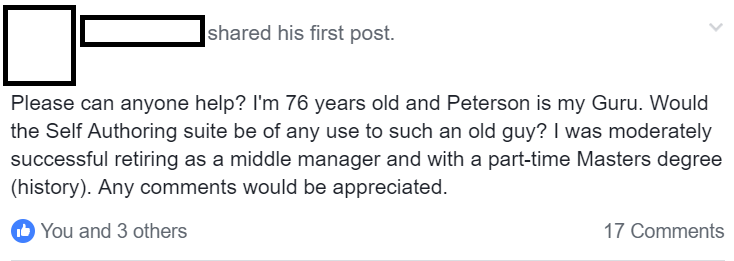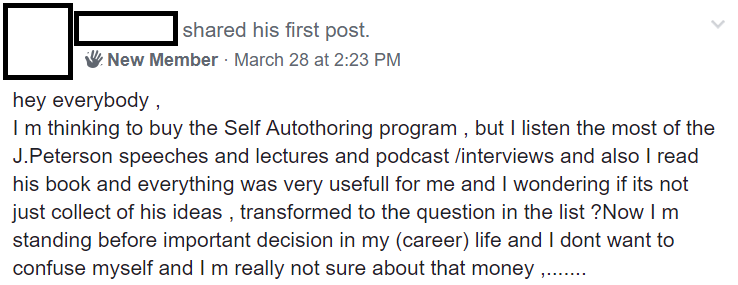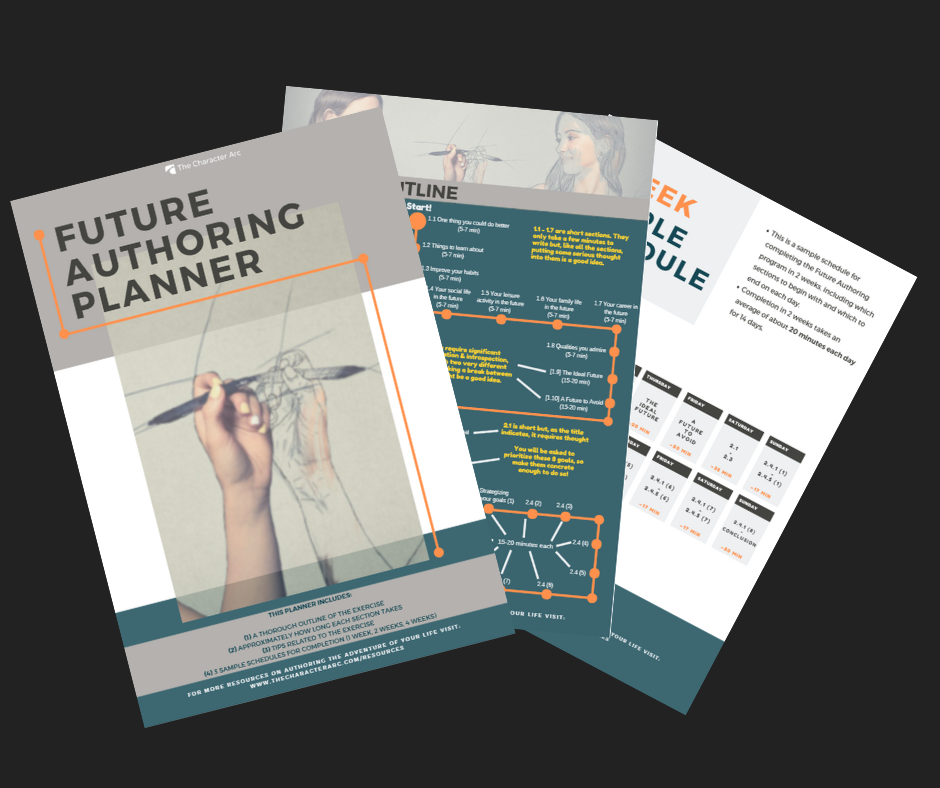Welcome to the most comprehensive online guide to Dr. Jordan B. Peterson’s Future Authoring program!
Here you’ll find all of the most useful information, advice, and experience-based opinion about the Future Authoring program from every online source available in one compiled and condensed guide.
(Sources include: Quora, Reddit, Facebook, YouTube, Twitter, various website reviews, research papers, information put out directly by Dr. Peterson, and my personal experience completing the Future Authoring program)
Purchase the Future Authoring program here
Here’s how this guide is structured:
- Introduction to The Future Authoring Program
- Should You Do it?
- Reasons & Objections
- What Is It Like?
- How Do You Get Through The Future Authoring Program?
- Problems & Solutions
- What Can You Get Out Of It?
- Resources
As you go through the guide, I also share my personal experience with the Future Authoring program for a first-person perspective on the process.
Introduction to The Future Authoring Program

If you’ve made it this far, then you’ve probably at least heard of Dr. Jordan B. Peterson. You might also know that the controversies in which he has been embroiled, the political stances he’s known for, and the topics he mainly receives media attention for are not the most interesting things about the man himself or his work.
His true contribution lies in the message he purveys through his many hours of lectures on YouTube, his 2 books, which have sold over 3 million copies, and his perpetually sold out lecture tour.
That message is fundamentally this: The meaning in life is to be found in the willing and truthful adoption of responsibility.
This powerful proposition is the driving force behind the creation of the Future Authoring program, which seeks to help people begin to organize their lives properly.
So what exactly is it?
The Future Authoring program is an online writing program that walks the user through the process of defining their future goals, and establishing an actionable plan for moving towards them. It is one component of the larger Self Authoring Suite which also includes Past and Present Authoring.
The program consists of 2 stages, broken into a total of 52 written sections. According to the Self Authoring website it takes about 4 hours to complete, but actual completion times vary widely.
At present, the Future Authoring program alone costs only $14.95, and the entire Self Authoring Suite is only $29.90 (and there’s an ongoing 2 for one special). Discounts on all programs are also frequently announced.
You can find out more about the nuts and bolts of the Future Authoring program on the Self Authoring website, or in condensed format in this document.
But that’s not what you really care about…
You want to know how it relates to YOU.
This guide helps answer that question with input from all over the web, from great reviews like this one, to lengthy Reddit threads, to YouTube reviews, Quora questions and answers, and the online discussions about Future Authoring on Facebook… not to mention my own personal experience completing the course.
So let’s begin!
Should You Do It?

One of the first things you might want to know is if the Future Authoring program is right for you. There are many reasons for doing the program, as well as objections (all of which we’ll go over below) but why even consider it in the first place?
To start, let me briefly tell you why I did it.
I had reached a crossroad in both my long term relationship, and in my career. I had recently left a lucrative position in tech to develop an entrepreneurial venture and things were very uncertain. I was running on fumes both financially and emotionally, all of which was putting strain on my relationship and sense of self worth.
I was teetering on the edge of some big decisions: Should I keep pushing forward, or go back to more stable work? Was it fair for me to continue my relationship with my financial future in question? How do I know whether to keep going or call it quits?
I was plagued by all these thoughts and by the uncertainty they reflected.
Like many others, I hold Dr. Peterson and the ideas he’s helped develop in very high esteem. It occurred to me that moving forward with a course based on those very ideas might not be a bad idea… So I purchased the Future Authoring program.
Of course, not everyone is in my situation and the reasons that people seem to find themselves drawn towards the program (aside from a general interest in Jordan Peterson himself) are myriad. But all the sources seem to indicate that there are 3 general reasons that people find themselves undertaking the Future Authoring program.
Below we go over the most commonly reasons people share for doing the program, and the most common objections people have against attempting it.
Reason 1: Going Through A Transition
One of the most frequent reason that people mention for their interest in the Future Authoring program is that they have arrived at some transition point in their life and want to make sure they are proceeding properly. The hope, for them, is that the program will help them determine the best way to move forward while decreasing the anxiety that goes along with making big changes.
Others with this reason may feel that they are on the edge of a decision about some transition, but have not yet settled on what to do. For these individuals, the reason for undertaking Future Authoring is to gain certainty about which of the options before them is the most suitable.
People who are going through transitions are often drawn to the program’s promise to help them create an actionable plan for the future.
Reason 2: Feeling Directionless
For some the challenge is not how to move forward, but what to aim at. While similar to the transition issue, the key difference is that those who are feeling directionless have reached a point of dissatisfaction with their lives, but have not yet formulated alternatives to their predicament.
Those who are aimless are aware of their discontent, but do not know what to do about it. They hope that, through participation in the program, they will be able to formulate a goal of value that will reveal an actionable direction to them.
People who feel directionless are often drawn to the program’s promise to help them in the formation of goals of value.
Reason 3: Feeling Trapped
Another recurring reason that people give for undertaking the Future Authoring program is that they are feeling trapped. People who give this reason have found themselves in bad situations that they are having a very hard time finding a way out of.
While these people may wish for a transition, or feel directionless to some degree, they are primarily stuck. They do not feel uncertainty about a chosen direction, or an overabundance of bad options; they see no real possibilities for change.
People who feel trapped are drawn to the program’s promise to help them form a vision of an ideal future.
Now on to the objections:
Objection #1: Age (too old/too young)
This concern pops up frequently. Parents want to purchase the program for a teenage child but wonder if it is useful for them. People in their 60s and 70s worry that the program may be for a younger audience.

Hard data on the program’s efficacy has been drawn mainly from pools of university students. Dr. Peterson has also stated that the younger the participants, the shorter the time horizon that Future Authoring is effective for. Therefore the focus of the course for a teenager might be the next 6 months rather than several years. It also stands to reason that small children might not benefit from a course designed for college age students.
As for older individuals, the Self Authoring website states: “The Future Authoring program is designed to help you imagine your ideal future, three to five years down the road.” This description implies that anyone who needs help imagining a near-term ideal future might benefit from the program, regardless of age.
The central idea of Dr. Peterson’s work: adopting responsibility and telling the truth, are the underpinnings of the Future Authoring program. There is no age group for which those values are not appropriate.
Objection #2: Don’t Have Any Goals
Another frequent concern for people considering doing the Future Authoring program is that they don’t have any goals, and so are concerned that the program will not have an appropriate starting point for them.
This objection seems to arise from a lack of understanding of what goes into the program. Having goals of value is not a prerequisite for participating in the program. In fact, it is actually the stated goal of completing it.
During the course of the program, the participant goes through the process of formulating goals of value, rank ordering them by importance, and drafting a plan of measurable actions that they can take to realize them.
Objection #3: General Uncertainty
This objection isn’t a specific concern, but a general skepticism about the program’s applicability to a person’s specific situation. Studies have been done showing the nature of the positive effects that users experience, but the scope of the data samples (mainly university students) is narrow enough to exclude many interested persons.
Adding to that is the familiarity that many prospective participants have with Dr. Peterson’s body of work. Many are uncertain if the program will contain anything new for them since they already have some knowledge of his work and philosophy.

However, the benefits of the program are not like the benefit of listening to lectures. For one, Future Authoring is both immersive and specific to the participant. Participation in the process is what provides the value.
The general uncertainty objection is particularly difficult to address. On Quora, Facebook, and elsewhere, many find themselves caught in a thought loop around Future Authoring. They wonder if they should buy it, and spend lots of time researching and fact finding online. The uncertainty doesn’t abate so, when they’ve exhausted static avenues of inquiry, they start new threads, search for even more stories, and generally avoid making a decision.
The impulse to research isn’t at all negative on it’s own, in fact it’s deeply practical. However, it can also begin to pathologize into entrenched indecision and procrastination. Only the individual can say for certain if this is what’s happening.
The only way out of that trap is to make a decision. At a certain point, the only real piece of information that will help determine if the program is worth doing will be the personal experience of going through it.
What Is It Like?

Again, we’ll forgo a nuts and bolts explanation of what the Future Authoring program includes beyond what was stated in the introduction.
If you would like to know more about the structure of the course (sections, completion times, etc.) You can find them in the intro to the Future Authoring course or consolidated in this document.
My experience of completing Future Authoring was filled with ups and downs. Initially it was exciting as I was forming goals and imagining possible futures. But then, as the difficult process of making concrete plans wore on, my progress began to slow.
Not only was it difficult to come up with solutions to my problems, but I was also having to take a hard look a the areas of my life I had been avoiding and neglecting. That was challenging to say the least.
Looking into the future is hard. As Jordan Peterson often reminds people, the unknown is full of dragons: the mythological embodiment of threat and opportunity. The future is also a judge, constantly reminding you of how you’re not good enough.
But it also holds the promise of everything that truly inspires you. When doing the exercise, the twin emotions of fear and excitement are always present. In that way, embarking on the adventure of Future Authoring is not for the faint of heart…
Here are some of the experiences most often reported by people undertaking the Future Authoring program:
- Insight before completion: People seem to have the experience of feeling more clear about their goals almost immediately after undertaking the exercise. Something about the process of defining goals brings their vision of the future into alignment right away.
- Initial Depression: The process of facing personal weaknesses (fully undertaken in the Present Authoring – Faults exercise) sometimes creates an initially negative feeling. Jordan Peterson addresses that concern in relation to Past Authoring in this blog post.
- Euphoria: for some people, the process of actively deciding on a desired future instantly activates some inspiration to start moving forward. Some have reported this as a slight barrier, as the impulse to go out and act partially overrides the impulse to complete the course.
- Procrastination: The course is said to take about 5 hours to complete, but it can take much longer depending on the individual. This leads many people to become frustrated and procrastinate. Having a solid plan of action seems to help with this.
How Do You Get Through The Future Authoring Program?
I worked on the Future Authoring program under two very different types of conditions.
In the beginning I just threw myself into it. Each time I went to work on it I ran up against stiff resistance in the form of writer’s block, anxiety, and apathy. At times I’d write for 30 minutes, and other times I’d stare at the screen for the same length of time. Finally I just gave up…
Some time later I decided I needed to take another crack at it. The second time I made a very detailed plan for myself, knowing I couldn’t be trusted to just wing it. The plan was pretty unambitious – I only committed to doing 5 minutes a day – but I knew I could manage to stick to it. And I did. As I made progress, I realized that I could actually write for much more than 5 minutes, once the pressure to do so was gone.
This is actually one of the behaviorist strategies that Jordan Peterson has himself recommended:
The Self Authoring Collaboration Group on Facebook is full of people who have completed the Future Authoring exercise. There are constant discussions there about both problems with completing the program, and their potential solutions.
Here are the 3 biggest problems people seem to face when attempting to completing the program, and some solutions that might help you avoid them.
Problem #1: False Starts
Like me, many people have the experience of starting the program with the best intentions and then slowly fizzling out due to poor planning, falling behind and losing motivation, or burning out. This is probably the biggest problem people face, and it’s not specific to Future Authoring. Online courses in general have abysmally low completion rates (lower than 20%).
This isn’t very surprising – anyone who’s ever bought a gym membership only to never use it understands the psychology – but it is unfortunate since the benefits only come through completion.
People tend to lose steam when they realize there may be actual hard work that goes into the completion process and their enthusiasm dries up.
Solution: What people have found most helpful in combating the False Start problems, is twofold:
- Have a detailed plan, and
- Be accountable.
In a nutshell that means figuring out a schedule for working on the program that works for YOU, and committing to SOMEONE ELSE to complete it. Without a plan, you will not make progress. Without committing to your plan, in a public way, you will be less likely to hold yourself accountable to that plan.
These indispensable rules for making progress are outlined in much greater detail in this blog post.
This free planner for the Future Authoring program provides a detailed outline of the exercise, estimates of how long each section takes, and several possible schedules for completing it.
You can also Join the Self Authoring Collaboration Group to work with other folks who are also committed to completing the program.
Problem #2: Perfectionism
A second problem people seem to run into is the desire to formulate perfectly complete answers their first time through the course, causing them to get stuck when that proves difficult. The Future Authoring program has you come up with very specific high value goals for the future, and some people may have a strong need to have the entire thing figured out before they reach the end.
This is, of course, impossible, and the ‘cart before the horse’ mentality leads people to stagnate.
Solution: The best advice for this problem comes from Dr. Peterson himself (see the video below): besides having a plan, try to do the exercise badly the first time.
The course is designed such that you can move around within the sections you’ve already completed. You can go back at any time to change, or clarify answers from previous sections. What often seems to happen is that people gain more clarity on earlier sections as they move through the exercise.
Aiming for perfection will only frustrate and stall progress. Cut yourself some slack and have some faith in the process.
Problem #3: Uncertainty
Some people find their own desires so conflicting that they can’t decide what to place as a priority. The goal formulation that the Program involves can be fairly daunting in this light.
People encountering this problem either have a hard time choosing among the many desirable goals that stand out to them, or they are unable to come up with inspiring goals at all. Prioritization of those goals (which the program also asks you to do) can also be difficult.
Solution: One of the solutions to this problem was outlined in Problem #2, that is: start by doing it badly. Not trying too hard to get the answers “right” will help you avoid the uncertainty problem.
A second strategy is to try to reframe the exercise. Instead of thinking about what you want, try to think of it in terms of who you want to be. Setting your goals based on the character traits you would like to adopt, rather than on the things you want to acquire may help goals come to mind that otherwise would not.
This strategy seems to be particularly effective for dealing with the uncertainty problem, but it also has implications for the perfectionism issue. If you can frame your aspirations in terms of who you are aiming to be, rather than strictly what you want to accomplish, it may help clarify goals for you.
For instance: “Earn a million dollars” as a goal may be hard to form a concrete actionable plan for. It’s more about what you want then who you want to be and, as such, may not function as a sustaining value-based goal.
Alternatively, a goal like: “Be a better sibling/son/daughter” may immediately have implication for action that can measurably move you forward. As with all things, aiming properly is the key.
What Can You Get Out Of It?
We’ve talked about what spurs people to start the Future Authoring program, but what can you expect to get out of it?
There is quite a bit of information out there about what finishing the Future Authoring program can lead to, including this paper on the benefits of writing by Dr. Peterson; and these studies. on the benefits of Future Authoring to students.
In short, the empirical findings of these sources is that groups of students completing the Future Authoring program have shown increases in University retention rate and academic achievement, with the most dramatic benefits to males and ethnic minorities.
Discussions on the numerous forums consulted for this guide also provide insight into people’s results. Here is a summary of what these sources have to say about the results of finishing the program.
- Increased Productivity: forming (or crystallization) goals of value, which is part of the course, seems to have the effect of spurring people to make progress toward those goals. The fear-based resistance that often hinders progress seem less daunting to people when the framework for moving forward (created during Future Authoring) is applied.
- Happiness as a secondary phenomenon: While purposefulness seems to increase (as discussed above), people don’t seem to directly experience positive emotion as an immediate result of completing the program. As “being happier” is not a lofty goal in Dr. Peterson’s estimation this result is not entirely surprising. However for many participants, the suffering that seems to come from aimlessness is consistently absent. Therefore a significant cause of pain is alleviated, even if an immediate outflow of positive emotion is absent. As Future Authoring plans are implemented, happiness is more regularly reported.
- Decreased uncertainty: Having a clear target to aim at and a detailed plan seems to lower uncertainty about how to move towards desired goals. The decrease in uncertainty that accompanies that clarification has been of major value to those who’ve done the program.
When I began Future authoring I had no idea if I would find it useful or not. I had watched many hours of Jordan Peterson’s lectures and read both of his books. I thought that might mean I would find the program’s exercises redundant at best.
This was not the case at all. Working on the Suite was a singular experience that helped me clearly specify my aims.
As I finished the exercise which was satisfying and challenging in equal measure, I wouldn’t say the feeling I got was one of satisfaction. It wasn’t even contentment with the achievement (though I was happy to be done).
It was something different – somewhere between excitement and anxiety. I realized that I seriously had my work cut out for me. The vision I’d created for myself was ambitious. Maybe overly ambitious. But it was also inspiring. It was something that, once it was completely formulated in my mind, seemed to take hold of me.
In the time since then, I’ve transformed my approach to work and my relationship with it. The ways in which I did so have met with immensely positive results and a real feeling of accomplishment.
I feel fully engaged and challenged by all of my pursuits in a way that I did not before. I’ve made decisions about things where previously I was at an impasse.
I now feel myself moving forward with a certainty of purpose that was previously absent in all of the difficult areas of my life.
I could have spent many times more than $14.95 I paid for the Future Authoring program and still felt I’d made out on the deal.
Resources
Self Authoring Suite website – The official website for the Self Authoring Suite including the Future Authoring program. All programs in the suite can be purchased here.
Free Future Authoring Planner – A free planner for the Future Authoring program that helps organize the exercise. It includes:
- A mapped outline of the program
- Approximately how long each section takes
- Tips on completing the program
- 3 Sample timelines for completion (1 week, 2 weeks, & 4 weeks)
Self Authoring Collaboration Group on Facebook – A group for people working on, or interested in the Self Authoring suite (Past, Present, and/or Future). Discussions relate to:
- collaboration on strategies for completing the program
- Q&A about the Suite
- sharing of insights into the process
- discussing the outcomes and results of the exercise.
